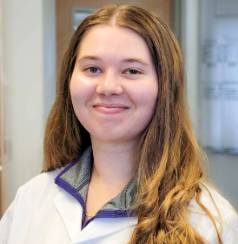Integrated Physiology and Molecular Medicine Laboratory
Leadership

Christopher L. Axelrod, MS
Director
Laboratory Members

Bolormaa Vandanmagsar, PhD
Senior Scientist

Elizabeth R. M. Zunica, PhD
Postdoctoral Fellow

Patricia Baumgarten, PhD
Postdoctoral Fellow

Elizabeth Heintz, MS
PhD Candidate

Analisa Taylor
PhD Candidate

Megan Dousay
Research Technician

Jackson Slone
Manager

Nicole Benigno
LSU

Calley Chauvin
LSU

Anan L. Cole
LSU

Noah J. Gibson
LSU

Christine Nguyen
LSU
Research Focus
Our laboratory is focused on improving the quality of life of patients with obesity-related diseases. We achieve this by translating clinical observations into basic scientific discoveries to be leveraged for development of more effective treatments.
About this Lab
The Integrated Physiology and Molecular Medicine Laboratory seeks to identify causes, consequences, and interventions for metabolic diseases. We employ basic, translational, and clinical research to discover novel therapies and optimize existing treatments for obesity-related diseases Overarching research interests include regulation of insulin sensitivity, glucose and lipid metabolism, mitochondrial function, obesity, type 2 diabetes, non-alcoholic fatty liver disease, cardiovascular complications, aging and lifespan, cancer, exercise, metabolic surgery, and drug discovery.
Laboratory Member Bios
- BA Kinesiology
University of Limerick, 1980 - MSc Exercise Biochemistry
University of Massachusetts, 1984 - PhD Human Bioenergetics
Ball State University, 1987 - Postdoctoral Fellow
Washington University School of Medicine, 1991 - Visiting Scholar
University of California San Diego, 2004
Dr. John Kirwan is the principal investigator of the IPMM laboratory and executive director of Pennington BIomedical Research Center. As a Clinical Translational scientist, Dr. Kirwan has maintained an independent and productive program pursuing research related to obesity, diabetes, and metabolism for over 25 years. Dr. Kirwan’s research interests include the underlying pathophysiology of type 2 diabetes and identification of lifestyle, surgical, and pharmacological interventions that facilitate weight loss and improve insulin sensitivity.
- Visiting Scholar
University of Legon, 2010 - BA Public Health
John Carroll University, 2011 - MS Exercise Physiology
Cleveland State University, 2016
Christopher Axelrod is the director of the IPMM laboratory. Christopher oversees day-to-day operation of the clinical, pre-clinical, and discovery-based programs. His research applies a bioenergetic lens to understanding the pathogenesis and treatment of complex metabolic diseases such as insulin resistance, obesity, type 2 diabetes, non-alcoholic fatty liver disease, and cancer. Current interests include development and testing of mitochondrial targeted pharmacotherapies, redox homeostasis in aging and disease, and therapeutic applications of metabolic surgery.
- MS/Physician Biology
Russian State Medical University, 1994 - PhD Genetics
Peoples’ Friendship University of Russia, 2001 - Visiting Scholar
Yonsei University, 2004 - Postdoctoral Fellow
National Institute on Aging, 2008 - Postdoctoral Fellow
Pennington Biomedical Research Center, 2012
Dr. Bolormaa Vandanmagsar is an assistant professor of research in the IPMM laboratory. Her work is focused on the link between chronic inflammation and obesity, obesity-associated insulin resistance, particularly, the association between muscle inflammation and skeletal muscle insulin resistance, and the role of metabolic states in the development of inflammation in muscle. Dr. Vandanmagsar is also interested in how skeletal muscle signals to other metabolic organs such as liver and pancreas when metabolic stress is present.
- BS Biochemistry
John Carroll University, 2010 - MS Nutrition
Case Western Reserve University, 2017 - PhD Nutrition
Case Western Reserve University, 2022
Elizabeth Zunica is a postdoctoral research fellow in the IPMM laboratory. Elizabeth obtained her PhD from Case Western Reserve University in 2022 in Nutritional Biochemistry. Her current work is focused on mechanisms underlying the progression of steatotic liver disease to liver cancer. Elizabeth has a broad interest in cellular metabolism and nutritional biochemistry with a focus on changes in mitochondrial function associated with disease and in response to therapeutic interventions.
- PhD Physiology
University of Potsdam, 2025
Dr. Patricia Baumgarten is a postdoctoral research fellow in the IPMM laboratory. Patricia obtained her PhD from The University of Potsdam in 2025 in Physiology. Her current work is focused on pathophysiology and mechanisms associated with sarcopenic obesity. Patricia has a broad interest in changes in metabolism associated with aging, with specific focus on how quality control/repair mechanisms influence disease acceleration and outcomes.
- BS Kinesiology
University of Louisiana, 2019 - MS Kinesiology
University of Louisiana, 2021 - PhD Kinesiology
Louisiana State University, 2026 (Anticipated)
Elizabeth Heintz is a doctoral candidate at Louisiana State University in the Department of Kinesiology. Her current work is focused on the role of mitochondrial solute carriers in the regulation of non-alcoholic fatty liver disease. Elizabeth has a broader interest in exercise physiology with a focus on mitochondrial adaptations associated with aging and chronic disease.
- BS Microbiology
Louisiana State University, 2025
Megan Dousay is a research technician in the IPMM laboratory. Megan supports preclinical metabolism studies and mitochondrial phenotyping by performing high-quality experimental work that advances the laboratory’s scientific mission. From supporting basic laboratory needs to running state-of-the-art tests that measure cellular energy production, they bring precision, curiosity, and technical skill to every experiment. Their work helps generate the discoveries that move new treatments and scientific breakthroughs closer to reality, making them an essential part of the lab’s mission to improve human health.
- BS Biology
University of Louisiana at Lafayette, 2023
Jackson Slone is the manager of the IPMM laboratory. The Manager of the Clinical-Translational Research Laboratory oversees operational and regulatory aspects of the research program, playing an integral role in bridging basic discovery to human health outcomes. In this role, they coordinate day-to-day laboratory activities, manage compliance with institutional and federal regulations, and support team members in delivering high-quality clinical and preclinical research outcomes. Through strategic oversight and a commitment to innovation, Jackson plays a central role in advancing the laboratory’s mission to translate scientific discovery into meaningful improvements in human health.
- BS Biology
Louisiana State University, 2022 - PhD Genetics and Genome Sciences
Case Western Reserve University (Anticipated)
Analisa Taylor is a doctoral candidate at Case Western Reserve University in the Department of Genetics. Her current work is focused on the role and regulation of mitochondrial Rho GTPases in the context of obesity and type 2 diabetes. Analisa has a broader interest in genetics and the development of genetic models to understand causes and consequences of insulin resistance and type 2 diabetes.
Nicole Benigno
Louisiana State University
Calley Chauvin
Louisiana State University
Anan L. Cole
Louisiana State University
Noah J. Gibson
Louisiana State University
Christine Nguyen
Louisiana State University
Research In Focus
- Deubiquitinating Enzymes Regulate Skeletal Muscle Mitochondrial Quality Control and Insulin Sensitivity in Patients With Type 2 Diabetes
- Restricting bioenergetic efficiency enhances longevity andmitochondrial redox capacity in Drosophila melanogaster
- Breast cancer growth and proliferation is suppressed by the mitochondrial targeted furazano[3,4-b]pyrazine BAM15
- Lipids activate skeletal muscle mitochondrial fission and quality control networks to induce insulin resistance in humans
- BAM15-mediated mitochondrial uncoupling protects against obesity and improves glycemic control
- Bariatric Surgery versus Intensive Medical Therapy for Diabetes - 5-Year Outcomes
- In vitro contraction protects against palmitate-induced insulin resistance in C2C12 myotubes
- A Whole-Grain Diet Reduces Cardiovascular Risk Factors in Overweight and Obese Adults: A Randomized Controlled Trial



